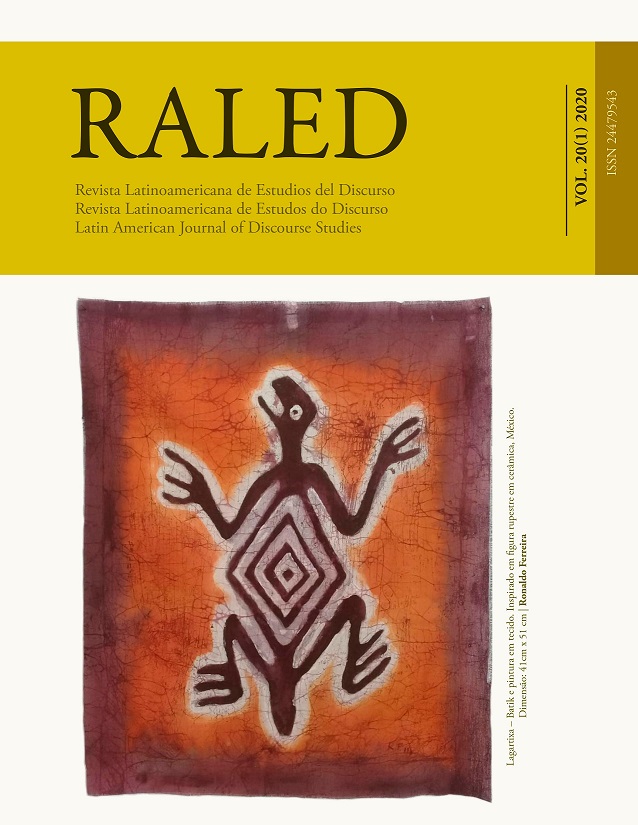Discursive appraisals about the homofobic murder of Daniel Zamudio in texts of chilean cyberpress
DOI:
https://doi.org/10.35956/v.20.n1.2020.p.44-63Keywords:
discourse studies. appraisal. evaluative keys. cyberpress. homophobia.Abstract
This article shows how the Chilean cyber press represented in their discourse the murder of Daniel Zamudio, produced in March 2012. The evaluative keys in the texts published right after the event reveal the ideological positioning in the discourse and the discursive representations displayed from both the authors’ voices and those added to the media discourse. The ethical appraisals inscribed and evoked construct the disapproval of the murder and murderers and, in turn, describe the responsibility of the political and religious institutions and of the Chilean society at large for such homophobic violence.
Downloads
References
Academia Chilena de la Lengua. 2010. Diccionario de uso del español de Chile. Santiago: MN Editorial.
Alegre, L. 2017. Elogio de la homosexualidad. Barcelona: Arpa Editores.
Atkins, S, Clear, J y Ostler, N. 1992. Corpus design criteria. Literary and Linguistic Computing 7 (1), 1-16.
Berardi, L. (ed.). 2003. Análisis Crítico del Discurso. Perspectivas Latinoamericanas. Santiago: Frasis editores.
Butler, J. 2017. El género en disputa. El feminismo y la subversión de la identidad. Barcelona: Paidós.
Chamocho, M. 2012. Sodomía. El crimen y pecado contra natura o historia de una intolerancia. Madrid: Dykinson.
Contardo, O. 2011. Raro. Una historia gay de Chile. Santiago: Planeta.
Eggins, S. 1994. An introduction to systemic functional linguistic. Londres: Pinter Publishers.
Fairclough, N. 2013. Critical discourse analysis. The critical study of language. New York: Routledge. Second Edition.
Fairclough. N. 2014. Critical Discourse Analysis. En P. Gee y M. Handford (Eds.). The Routledge Handbook of discourse analysis, pp. 32-48. London: Routledge.
Fluxá, R. 2014. Solos en la noche. Zamudio y sus asesinos. Santiago de Chile: Catalonia.
Fone, B. 2008. Homofobia. Una historia. México: Océano.
Foucault, M. 1973. El orden del discurso. Buenos Aires: Tusquets.
Gramsci, A. 1978. Los intelectuales y la organización de la cultura. México: Juan Pablos Editor.
Halliday, M. A. K. y Matthiessen, C. 2014. An introduction to functional grammar. Quarter edition. New York: Oxford University Press.
Halperin, D. 2007. San Foucault. Para una hagiografía gay. El cuenco de plata: Ediciones literales.
Hood, S. 2010. Appraising Research: Evaluation in Academic Writing. New York: Palgrave Macmillan.
Kress, G. 2010. Multimodality: a social semiotic approach to contemporary communication. London: Routledge.
Lemke, J. 1995. Intertextuality and text semantics. En P. Fries y M. Gregory (Eds.). Discourse in society: systemic functional perspective, pp. 85-144. Norwood: Ablex.
Martin, J. 1992. English text: system and structure. Philadelphia: John Benjamins.
Martin, J. 2003. Introduction. Text 23, 2: 171-181.
Martin, J y Rose, D. 2008. Genre Relations: Mapping Culture. London: Oakville.
Martin, J. y White, P. 2005. Language of the Evaluation. Appraisal in English. Ney York: Palgrave Macmillan.
Núñez Noriega, G. 2015. Sexo entre varones. Poder y resistencia en el campo sexual. México: UNAM. Instituto de investigaciones sociales.
Oteíza, T. 2017. The Appraisal Framework and discourse analysis. En T. Barlett y G. O’ Grady (Eds.). The Routledge Handbook of Systemic Functional Linguistics, pp. 457-472.
Oteíza, T. y Pinuer, C. 2012. Prosodia valorativa: construcción de eventos y procesos en el discurso de la historia. Discurso y Sociedad 6, 2: 418-446.
Oteíza, T, Dalla Porta, C y Garrido, G. 2014. “La evidencialidad en la construcción de la significación histórica por estudiantes de Licenciatura de Historia”. Onomázein 9, 57-80.
Pardo, N. 2007. Cómo hacer un análisis crítico del discurso: Una perspectiva latinoamericana. Santiago: Frasis.
Pollak, M. 1987. La Homosexualidad Masculina o ¿La Felicidad en el Ghetto? En P. Ariès y A. Béjin (Comps.). Sexualités occidentales, pp. 37 55. Buenos Aires: Paidós.
Van Dijk, T. 2009. Discurso y poder. Contribuciones a los estudios críticos del discurso. Barcelona: Gedisa.
Volóshinov, V. I. 1973. Marxism and the philosophy of language. Nueva York: Seminar Press.
Wodak, R y Meyer, M. 2003. Métodos de Análisis Crítico del Discurso. Barcelona: Gedisa.
White, P. 2010. Talking Bakhtin seriouly: dialogic effect in written, mass communicative discourse. Japanese Journal of Pragmatics 12, 37 53.
Zubiaur, I. 2007. Pioneros de lo homosexual. Barcelona: Anthropos.
Downloads
Published
How to Cite
Issue
Section
License

This work is licensed under a Creative Commons Attribution-NonCommercial-NoDerivatives 4.0 International License.
The authors retain the copyright and guarantee RALED the right to be the first publication of the work as well as a Creative Commons Attribution License that allows others to share the work with recognition of authorship and the initial publication in this journal.




